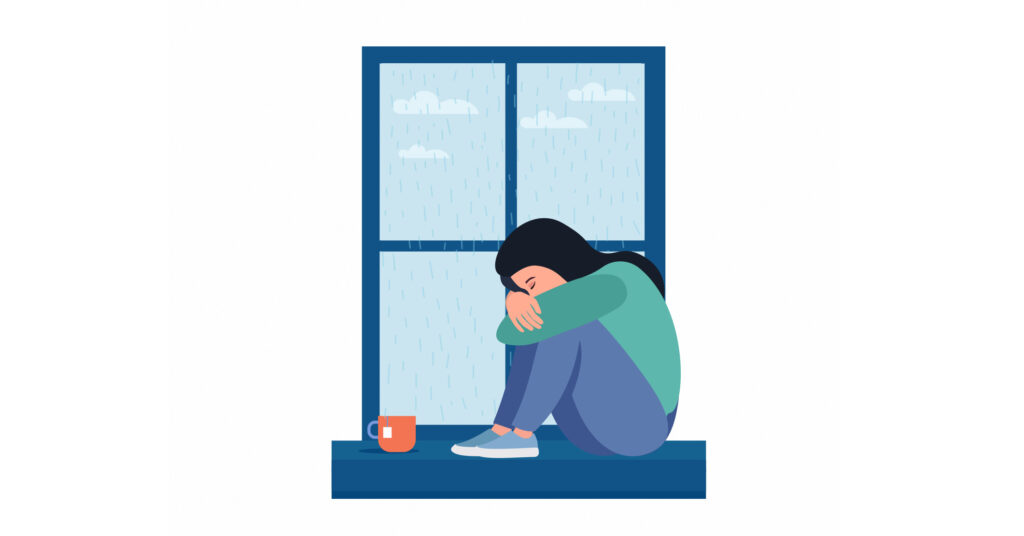Depression is a common and serious mood disorder that changes how a person thinks and feels. It’s also one that’s often misunderstood. Many people refer to themselves as depressed if they’re feeling down about something, but there are clear diagnostic criteria that must be met for someone to be classified as having depression. In this guide, we’ll answer some common questions, including “How do I know if I have depression?” and “What’s the difference between depression and stress?”
What Is Depression?
Depression is a mood disorder characterized by low mood or a loss of interest in day-to-day activities that affects a person’s ability to function in normal life and lasts for 2 weeks or more. Medical professionals refer to severe, persistent depression not caused by external factors (such as the loss of a loved one or other serious life events) as clinical depression or major depressive disorder. Some forms of depression, such as seasonal affective disorder and postnatal depression, have a clear cause. In other cases, there’s not an obvious trigger or reason for a depressive episode.
The World Health Organization estimates that 5% of adults suffer from depression. Women are more likely to be diagnosed with depression than men. However, it’s unclear whether this difference in diagnosis rates is due to cultural issues discouraging men from seeking treatment if they’re experiencing symptoms of depression.
How Do I Know If I Have Depression?
Now you know what clinical depression and major depressive disorder are. But you may be wondering, “How do I know if I have depression?” There are several signs and symptoms of depression to look out for, including:
- Persistent feelings of sadness or anxiety
- Increased irritability
- Loss of interest in hobbies or social activities
- Low energy
- Difficulty sleeping
- Reduced appetite
- Trouble concentrating
- Memory troubles
- Aches and pains with no apparent cause
- Suicidal thoughts
To be diagnosed with depression, a person doesn’t have to experience all these issues, and the symptoms don’t have to be present all the time. People with depression can have good days and bad ones. The presence of some of these depression symptoms frequently over 2 or more weeks could suggest that someone is going through a depressive episode.
Depression vs. Stress or Sadness
There’s some overlap between the symptoms of depression and the symptoms of stress or anxiety. People who are stressed may also find it difficult to sleep, feel overwhelmed, struggle to concentrate and lose their appetites.
The difference between stress and depression is that stress usually has a clear cause, such as a looming deadline, a college exam or a challenging life event, and once that event has passed, the negative feelings go away too. Stress can be a good thing if it’s short-term and used as a motivational factor. Around 85% of Americans say they experience workplace stress, and if that stress is channeled productively, it can be helpful.
However, stress that lasts too long or that’s too intense can be harmful to your physical and mental health. Anxiety can also be damaging if it prevents you from doing important tasks or activities you’d usually enjoy.
Depression is longer-lasting and can have more severe symptoms. While it’s possible to work through stress, individuals who are struggling with depression may find their symptoms feel insurmountable.
Conditions Similar to Depression
The low energy and mood issues that are common signs of depression sometimes have a different cause. For example, people with anemia or chronic fatigue syndrome may experience feelings of fatigue, weakness and low mood, which can look like depression at first. Similar symptoms, along with unexplained weakness, are common in individuals with undiagnosed diabetes. However, as these conditions progress, patients will show other symptoms that aren’t associated with depression.
Because the symptoms of depression are so similar to the symptoms of other conditions, it’s important to seek medical advice if you’re experiencing persistent changes in your mood, mental clarity or appetite. There are many potential causes for such changes, and identifying the cause is the first step to recovery.
What to Do If You Think You Have Depression
If you’re struggling with the symptoms of depression or concerned about a change in the behavior of someone close to you, know that help is available. At Mental Health Hotline, we run a 24-7 assistance line that can connect you to a local counselor to provide free, confidential support. Whenever you need to talk, we’re here.
